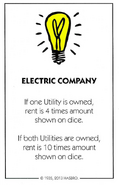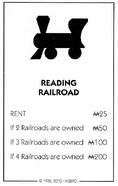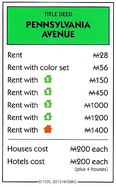A rent is a fee charged to a player who visits and uses somebody else's property. If the property owner asks the visitor (non-owner) to pay the rent, that visitor (non-owner) must pay the rent to that owner.
Rent is the most common way in Monopoly for a player (the owner) to collect the money from the other players (the non-owners). Owning more properties and having buildings are the ways to increase the rent fees to higher levels. Having properties with higher rent levels can more easily bankrupt your opponents.
Properties
Each property has its own Title Deed cards showing the rent prices and levels. Each type of property has its different rent schedules.
Utilities

Utility Title Deed
In a utility, the rent depends on the dice rolled. If a non-owner lands on a utility and the owner asks that non-owner to pay, the non-owner will roll the dice again to determine the rent.
Railroads

Railroad Title Deed
If you own just 1 railroad, the rent is a basic $25. For each railroad added to your collection, the rent is doubled. If you own all 4 railroads, the rent is $200. If a non-owner lands on a railroad and the owner of that railroad asks that non-owner to pay, the non-owner will pay the rent based on the number of railroads that the same owner has.

Street Title Deed
Streets
The Title Deeds on the streets are the most detailed of the three types of properties. A street title deed card has a list of differing rent prices.
If you own 1 or 2 streets but don’t own a complete color set, you are limited to the base rent. The base rent is the small cost for visiting the unimproved lot, a street without a building.
If you own all the streets in a complete color set (having a monopoly), the base rent is doubled on unimproved lots. In addition, you have the ability to build houses and hotels on the streets of your complete color set. Having a building on a street will make the rent price on that street go higher. The more houses a street has, the higher the rent is on that street. A hotel boosts the highest rent possible on a street.
- In the Mega Edition, a skyscraper boosts the highest rent possible on a street.
If a non-owner lands on a street and the owner of that street asks that non-owner to pay, the non-owner will pay the rent based on the building(s) on that street or, if there are no buildings on a street, whether the same owner has the complete color set.
Paying Rent
When the non-owner lands on a property that somebody else owns, the owner has to do something. A property owner must ask that non-owner to pay the rent before the next player rolls the dice.
The owner will tell the proper amount of rent to the non-owner according to a property and buildings (and any applicable bonuses for having multiple same-type properties).
When the next player rolls the dice but the owner does NOT ask, the non-owner does not have to pay. The owner has blown their chance of collecting rent.
Issues
Mortgages
If a property is mortgaged, the owner cannot collect the rent from that property.
When a non-owner lands on a mortgaged property, the owner cannot ask that non-owner to pay the rent. Therefore, the non-owner does not lose anything.
Utilities and Railroads
If you own multiple utilities or railroads, mortgaging your utilities or railroads will not affect the current rent level. The current rent level depends on how many utilities or railroads that you own, not on how many that are unmortgaged. Your properties that are mortgaged are still yours.
- If you own all 2 utilities but you mortgage 1 of them, you can still collect 10 times the amount shown on the dice rolled when a non-owner lands on your unmortgaged utility.
- If you own 3 railroads but you mortgage 2 of them, you can still collect $100 from a non-owner when they land on your unmortgaged railroad.
Debt & Bankruptcy
Collecting rent is one of the ways to bankrupt your opponents.
If a non-owner lands on your property (and you ask them to pay) but they do not have enough cash to cover the required rent amount, they are in debt. When this happens, the non-owner will mortgage their properties (and sell buildings) to raise money.
- If they have enough after mortgaging (and selling), they have paid the debt and they will continue to play the game.
- If they still do not have enough funds after they have mortgaged all of their properties (and have sold all the buildings), they declare bankruptcy and all of their properties are turning over to you.